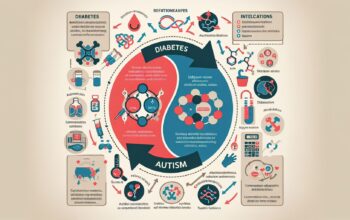Understanding the complex relationship between diabetes and autism is critically important for millions of individuals across the globe. According to the Centers for Disease Control and Prevention, approximately 1 in every 54 children has been identified with autism spectrum disorder (ASD) and an estimated 34.2 million people in the U.S. have diabetes. While these two conditions may appear to occupy distinct domains, recent research suggests that there might be a significant correlation. This article will delve into what you need to know about diabetes and autism, from the potential factors behind their intersecting paths, to how these conditions are managed when they coexist.
Unpacking the Conditions: Autism and Diabetes
What is Autism?
Autism Spectrum Disorder (ASD) is a complex developmental condition that involves persistent challenges in social interaction, speech, nonverbal communication, and restricted or repetitive behaviors. It is termed a “spectrum” disorder because it encompasses a wide range of symptoms, skills, and levels of impairment or disability.
What is Diabetes?
On the other hand, diabetes is a chronic health condition that affects your body’s ability to carry glucose, the main type of sugar in the blood, from the blood into the cells to be used as energy. If left unregulated, this can lead to high blood sugar levels and can cause serious health complications, including heart disease, stroke, kidney damage, and nerve damage.
Tracing the Intersection: Research Revealing a Connection
An increasing number of research studies indicate a compelling connection between diabetes and autism, especially in terms of gestational diabetes and the risk of autism in children.
Gestational Diabetes and Autism
A study published in the Journal of Autism and Developmental Disorders examined the medical records of nearly 320,000 children and found that the risk of autism increases by almost 50% in children born to mothers who developed gestational diabetes before 26 weeks of pregnancy. However, the risk did not increase for mothers who developed gestational diabetes after 26 weeks. Although the mechanism linking gestational diabetes and autism isn’t completely understood, it’s suggested that exposure to high glucose levels in the womb might affect the development of the baby’s brain.
Type 1 Diabetes and Autism
Another study conducted by researchers from Kaiser Permanente found an increased risk of autism in children whose mothers had Type 1, Type 2 or gestational diabetes at any point during pregnancy. The study discovered that children exposed to maternal diabetes had increased rates of ASD as compared to those without maternal diabetes exposure.
Managing Coexisting Autism and Diabetes: Crafting a Care Plan
Having autism can affect the management of diabetes since individuals with ASD often struggle with changes to their routine and have difficulty understanding complex health information. Add to this the fact that managing diabetes requires continuous monitoring, dietary adjustments, and often, injections or medication. A structured care plan becomes crucial in such situations.
Medical Team Involvement
People with both autism and diabetes should have a care team that includes doctors, mental health professionals, diabetes educators, dietitians, and social workers. This team can help to create and enact a plan that accommodates the unique needs of the individual.
Tailored Communication
Often individuals with autism process information differently, so presenting the necessary knowledge about diabetes management in simpler terms or using visual aids can be incredibly helpful. Regular follow-ups are necessary to ensure the patient understands and adheres to the care plan.
Family and School Support
Support from the family and school is critical for children with autism and diabetes. This would mean taking measures to provide balance and consistency from home to school, which can help reduce anxiety and support better health outcomes.
Psychological Assistance
Individuals with autism and diabetes may also require psychological assistance because they might have increased anxiety related to diabetes management or poor coping skills. Proper mental health support can go a long way in easing these anxieties and improving overall well-being.
The Ongoing Quest for Knowledge
While research has uncovered valuable insights about the links between autism and diabetes, the relationship between these two conditions is still being investigated. Ensuring that individuals with both conditions receive optimized care is crucial as we continue to explore the complex web of biological interactions at play. As understanding deepens, it opens new avenues to manage, and one day, potentially reduce the risk associated with these conditions. Remember, early diagnosis and prompt treatment are key to managing both diabetes and autism effectively.
In conclusion, while diabetes and autism may seem unrelated at first glance, there are connections that bind these conditions together. Understanding this relationship is essential for providing the best care and improving the overall quality of life for those affected by these conditions. Always consult your healthcare provider for advice about any health concerns. Together, we can work towards a healthier world with better interventions and greater empathy. The intersection of autism and diabetes is a demanding field, but with continuing research and education, we can look forward to improved understandings, treatments, and outcomes.




